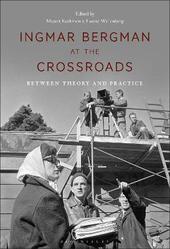
|
Ingmar Bergman at the Crossroads: Between Theory and Practice
Hardback
Main Details
| Title |
Ingmar Bergman at the Crossroads: Between Theory and Practice
|
| Authors and Contributors |
Edited by Maaret Koskinen
|
|
Edited by Louise Wallenberg
|
| Physical Properties |
| Format:Hardback | | Pages:272 | | Dimensions(mm): Height 229,Width 152 |
|
| Category/Genre | Film theory and criticism
Individual film directors and film-makers |
|---|
| ISBN/Barcode |
9781501389641
|
| Classifications | Dewey:791.430233092 |
|---|
| Audience | | Professional & Vocational | |
|---|
| Illustrations |
21 bw illus
|
|
Publishing Details |
| Publisher |
Bloomsbury Publishing Plc
|
| Imprint |
Bloomsbury Academic USA
|
| Publication Date |
15 December 2022 |
| Publication Country |
United States
|
Description
Ingmar Bergman's rich legacy as film director and writer of classics such as The Seventh Seal, Scenes From a Marriage, and Fanny and Alexander has attracted scholars not only in film studies but also of literature, theater, gender, philosophy, religion, sociology, musicology, and more. Less known, however, is Bergman from the perspective of production studies, including all the choices, practices, and routines involved in what goes on behind the scenes. For instance, what about Bergman's collaborations and conflicts with film producers? What about his work with musicians at the opera, technicians in the television studio, and actors on the film set. What about Bergman and MeToo? In order to throw light on these issues, art practitioners such as film directors Ang Lee and Margarethe von Trotta, film and opera director Atom Egoyan, and film producer and screenwriter James Schamus are brought together with academics such as philosopher and film scholar Paisley Livingston, musicologist Alexis Luko, and playwright and performance studies scholar Allan Havis to discuss Bergman's work from their unique perspectives. In addition, Ingmar Bergman at the Crossroads provides, for the first time, in-depth interviews with Bergman's longtime collaborators Katinka Farago and Mans Reutersward, who both have first-hand experience of working intimately as producers in film and television with Bergman, covering more than 5 decades. In an open exchange between individual and institutional perspectives, this book bridges the often-rigid boundaries between theoreticians and practitioners, in turn pointing Bergman studies in new directions.
Author Biography
Maaret Koskinen is Professor Emeritus in Film Studies at Stockholm University, Sweden. Louise Wallenberg is Professor in Fashion Studies at Stockholm University, Sweden.
ReviewsAn essential new anthology that will pay dividends in Theatre, Film, and Bergman Studies for years, perhaps decades to come. The collected essays and interviews are smart, engaging, and focused on concerns of vital interest to the contemporary reader. Nobody interested in the Demon Director can afford to pass it up. * Daniel Humphrey, Professor of Performance, Visualization, and Fine Arts, Texas A&M University, USA, and author of Queer Bergman: Sexuality, Gender, and the European Art Cinema (2013) * This new anthology by renowned Bergman scholars Maaret Koskinen and Louise Wallenberg presents a cloud of witnesses, giving testimony on diverse aspects of the art of the multifarious Swedish film director and writer. Beyond the obvious heterogeneity of the different perspectives lies a recurrent common interest in the practical and also collective work, the "art of making illusions" and thus, the art of "making the silence speak". * Lars Gustaf Andersson, Professor in Film Studies at the Centre for Literature and Languages, Lund University, Sweden * Painting a truly mature, challenging picture of Bergman's overdetermined authorship, both celebrating its results on screen while also interrogating the ethical costs of such uncommon power spanning multiple decades, Maaret Koskinen and Louise Wallenberg's expertly curated volume rises above the current Manichean vogue for designating authors as simple heroes or villains. With its genuinely refreshing emphasis on Swedish production context and a highly generative mix of academic analyses, interviews with collaborators, and commentaries by well-chosen film and theatre directors of subsequent generations, this very welcome book features an entirely apposite mix of admiration, new insight, and more troubled reflection. * Hamish Ford, Senior Lecturer in Film, Media and Cultural Studies, University of Newcastle, Australia *
|